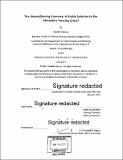The (home)sharing economy : a viable solution to the affordable housing crisis?
Author(s)
Marcus, Noelle
DownloadFull printable version (10.13Mb)
Other Contributors
Massachusetts Institute of Technology. Department of Urban Studies and Planning.
Advisor
Ingrid Gould Ellen.
Terms of use
Metadata
Show full item recordAbstract
While it is acknowledged that our society is rapidly aging, the best way to ensure that people age with dignity, independence and security remains nebulous. Within 20 years, one out of three households in the U.S. is projected to be headed by someone over the age of 65; and most people want to age in their homes and communities (JCHS, 2016; AARP 2014). One possible mechanism to address both the current housing affordability challenge and the growing demand to age in place is the low-cost, self-help model of homesharing, where two or more unrelated people live together in a single dwelling. Agency-assisted homesharing emerged in the 1970's, through which organizations pair older households with younger tenants. Yet, homesharing remains a niche phenomenon today.' This thesis addresses the question of whether, given the rise of the digital sharing economy, agency-assisted homesharing could become a mainstream practice in the U.S. To address this question, I designed and implemented a Nationwide Homesharing Survey in collaboration with the MIT AgeLab. The survey's 1255 complete responses, supplemented by 50 informational interviews with experts, policy-makers, and potential homesharers, suggests that a significant market for homesharing exists in the U.S. This paper reflects on the ways in which the contemporary sharing economy has facilitated greater trust between strangers, and suggests that a technology-enabled homesharing match-up program may enable broader adoption from older people who wish to remain in their homes as they age, as well as increase the overall stock of affordable housing in the U.S.
Description
Thesis: M.C.P., Massachusetts Institute of Technology, Department of Urban Studies and Planning, 2017. Cataloged from PDF version of thesis. Includes bibliographical references (pages 69-71).
Date issued
2017Department
Massachusetts Institute of Technology. Department of Urban Studies and PlanningPublisher
Massachusetts Institute of Technology
Keywords
Urban Studies and Planning.